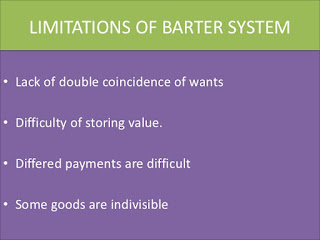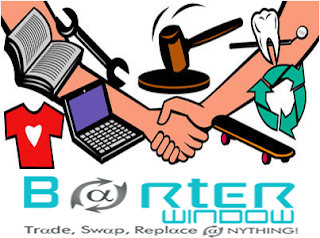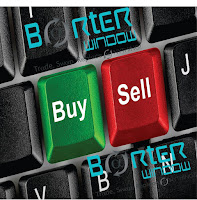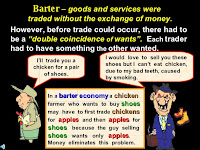 The barter system enables two parties to exchange goods or services based on mutually perceived value.
The barter system enables two parties to exchange goods or services based on mutually perceived value.
Barter transactions occur when economic actors, such as individuals, businesses and nations, exchange goods or services without the use of a monetary medium. While a barter economy is considered more primitive than modern economies, barter transactions still occur in the marketplace. Below are simple examples of bartering for goods and services, along with a common contemporary barter exchange.
Bartering with Consumer Goods:
In its most elementary form, bartering is the exchange of one valuable product for another between two individuals. Person A has two chickens but wants to get some apples; meanwhile, Person B has six apples but wants some chickens. If the two can find each other, Person A might trade one of his chickens for three of Person B's apples. No medium of exchange is used. The problem posed by simple bartering is what economists call the double coincidence of wants. In this case, Person A is not satisfied unless he crosses paths with a chicken-wanting apple-carrier, while Person B needs an apple-wanting chicken-carrier.
Bartering with Consumer Services:
Bartering can also take place as an exchange for services. Swap Products Services are saleable acts, such as performing mechanical work or legal representation. If one professional agrees to perform tax accounting for another professional in exchange for cleaning services, this is a barter transaction. Much like with consumer goods, a barter transaction involving consumer services has demand and supply limitations.
Modern Advertising Services:
The most common form of business-to-business bartering in modern economies involves the trading of advertising rights. In these cases, one company sells its available ad space to another company in exchange for the right to advertise on the second company's space. These can be TV rights, radio rights, actual billboards or Internet ad spaces.
The Mool-mantra of this concept is to wipe-out the liquidity crisis that we currently face by helping you 'Trade, Swap, Replace ANYTHING". Your posts on this website would be absolutely free and even you strike a deal on your own. we don't want a penny out of it.
Trade, Swap, Replace ANYTHING! Swap Products Online only at Barter window.
We don't charge you, we are here to help you.
Barter your product for the products published on the website.
Trade, Exchange, Swap and Barter....
"Paisa Mat Bol, Keemat se Tol"















